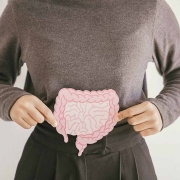Is a Plant-Based Diet the Key to Solving My Digestive Disorders?
Plant-based diets are on the rise primarily due to the increasing recognition of their health benefits and better nutritional intake. As research continues to highlight the positive impacts of a plant-based diet on health and well-being, you may be among the many who are considering switching to this dietary approach.
When we talk about plant-based, you might only think “vegan” or “vegetarian,” but today there are many more types to consider, depending on your health profile. As a general rule, if you’re eating plant-based that means you are not eating meat or dairy products, eggs, poultry, or seafood. But as you’ll see from the list below, there are many ways to approach it, including keeping small amounts of meat and dairy in your diet but making an effort to add more plant-based food sources.
Plant-based diets include:
- Vegan – includes only nutrient-dense plant-based foods with no animal-derived products (fruits, vegetables, legumes, nuts, seeds)
- Vegetarian (lacto vegetarian, ovo-vegetarian, lacto-ovo vegetarian) – excludes all meat, fish, and poultry; lacto vegetarian includes some/all dairy; ovo vegetarian includes eggs
- Mediterranean – includes abundant amounts of fruits, vegetables, nuts, seeds, legumes, and moderate amounts of red meat, poultry, eggs dairy, and seafood
- Raw food – includes mostly or exclusively raw and unprocessed foods; sometimes includes eggs and dairy, and occasionally raw fish and meat
- Whole food plant-based – includes whole, minimally processed foods – primarily vegetables, fruits, legumes, seeds, and nuts; limits/excludes animal products; excludes refined foods
- Macrobiotic – includes whole, organic, and unprocessed foods and avoids high-fat, processed, and sugary foods
- Alkaline – includes alkaline foods (fruits, nuts, legumes, and vegetables), and avoids acidic foods (fish meats, poultry, grain, alcohol) and neutral foods (dairy, starches, milk, natural fats)
- Pescatarian – includes seafood as a protein source, avoids red meat and poultry
- Flexitarian – includes dairy and eggs, encourages the addition of plant-based food sources and eating less meat
The growing availability of plant-based options in stores and restaurants makes it much easier for you to adopt; but can a plant-based diet solve your digestive disorders?
Digestive Disorders and The Impact of Plant-based Diets
Digestive disorders such as Crohn’s disease, ulcerative colitis, or irritable bowel syndrome can significantly impact your quality of life. The ongoing nature of these conditions means that symptoms of discomfort and pain can disrupt your day-to-day activities and routine tasks. If you’re struggling with digestive issues, you may be wondering if changing your diet could help, especially since a plant-based diet comes with many benefits. The following factors highlight why a plant-based diet might be an idea worth trying.
- Increased Fiber Intake
Plant-based diets tend to have a high fiber content. Fiber is essential for maintaining regular bowel movements and preventing constipation, a common digestive symptom. Incorporating more plant-based foods into your diet will result in increased fiber consumption and, by association, may improve digestion with more regular bowel habits. It is important to note there are 2 different types of fibers. Soluble and insoluble fibers are primarily found in fruits, vegetables, and whole grains. Soluble fiber attracts water, binds to fatty deposits (cholesterol), and eliminates them from the body. Insoluble fiber adds bulk to stool and helps to move food through the gut. - Reduced Inflammation
Studies show that chronic inflammation in the digestive tract can contribute to various digestive disorders. Adopting a plant-based diet limits or restricts pro-inflammatory foods (processed sugars and foods high in trans and saturated fats) giving the gut a chance to heal. By eating more foods high in healthy omega-3 fatty acids (which we don’t always get enough of), you’ll also be keeping the omega-3 / omega-6 ratio in balance. Plant-based foods are also naturally anti-inflammatory thanks to their abundance of antioxidants, phytonutrients, and fiber. The anti-inflammatory properties in fruits and vegetables may not only reduce the risk of developing a digestive disorder but may protect against other chronic inflammatory diseases as well. - Healthier Gut Microbiome
The gut microbiome plays a crucial role in our digestive health. It does everything from nutrient absorption to boosting immune function. Research suggests that adopting plant-based diets increases the number of beneficial bacteria in our gut. How? Many plant-based foods are prebiotics and prebiotics are known to feed beneficial gut bacteria and help to promote the accumulation of healthy probiotics in the gut. - Removal of Meat-based Compounds
Some people have a problem breaking down the fats and proteins in animal byproducts. This can lead to increased inflammation and gut disturbances that can lead to chronic inflammation and chronic constipation in some cases. High intake of animal byproducts can lead to IBD and constant exposure can lead to colon cancer.
Incorporating More Plant-Based Foods Into Your Dietary Habits
Now that we’ve mentioned some benefits of a plant-based diet, here are a few tips on how to start.
- You certainly don’t want to jump into any of the diets above without knowing how it may affect you, especially if you have a digestive disorder or another type of chronic condition. We can help you see the big picture – including the potential risks and benefits of major dietary changes and how the changes will impact your overall health. Working with our nutritionist will help you get the most out of a plant-based diet.
- Start slowly – Transitioning to a plant-based diet doesn’t have to happen overnight. Begin by incorporating one plant-based meal or snack into your daily routine, gradually increasing the frequency over time. A plant-based diet can help the body naturally detox. Gradually increasing plant-based foods over time can also help with reducing the severity of detoxing effects that eating a full plant-based diet can potentially have.
- Focus on variety – Explore a wide range of fruits, vegetables, whole grains, legumes, nuts, and seeds to ensure you’re getting a diverse array of nutrients and flavors in your diet.
- Experiment with recipes – Get creative in the kitchen by trying out new plant-based recipes. Find inspiration online, in cookbooks, or through cooking classes to discover satisfying plant-based meals. A nutritionist is a wonderful resource for recipes and recommendations for specific diets.
- Make simple swaps – Replace meat with beans or lentils in your favorite dishes, swap dairy milk for almond or oat milk, and use plant-based alternatives like tofu, seitan, and tempeh, instead of animal protein.
- Plan ahead – Plan your meals and snacks to ensure you have plenty of nutritious plant-based options on hand. Preparing meals in advance can make it easier to stick to your plant-based diet goals. During grocery shopping swap out one unhealthy snack for a healthy plant-based snack.
- Listen to your body – Pay attention to how your body responds to different plant-based foods and make note of any changes in digestive habits. Everyone’s digestive system is unique, so it’s essential to find what works best for you and adjust your diet accordingly.
Transitioning to a plant-based diet may improve your digestive disorders and reduce the severity of symptoms that you experience. To discuss the benefits of starting a plant-based diet, the best way to go about it, and other nutritional advice that might help improve the presence of digestive symptoms, please call us at 703-532-4892 and make an appointment.
We are here for you, and we want to help.
Our goal is to return you to optimal health as soon as possible. To schedule an appointment please call: 703-532-4892 x2
References
- https://www.sciencedirect.com/science/article/pii/S2161831322007001
- https://www.ncbi.nlm.nih.gov/pmc/articles/PMC10057430/
- https://www.ncbi.nlm.nih.gov/pmc/articles/PMC6382506/
- https://www.tandfonline.com/doi/full/10.1080/19490976.2022.2127446
- https://www.ncbi.nlm.nih.gov/pmc/articles/PMC8389558/
- https://www.sciencedirect.com/science/article/pii/S2161831322007001
We are here for you, and we want to help.
Our goal is to return you to optimal health as soon as possible. To schedule an appointment please call: 703-532-4892 x2











Leave a Reply
Want to join the discussion?Feel free to contribute!